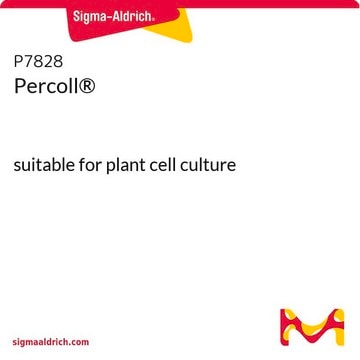475855
Miracloth
Rapid, effective filtration of homogenates
Synonym(s):
Protein extraction filter cloth
Sign Into View Organizational & Contract Pricing
All Photos(1)
About This Item
UNSPSC Code:
41104900
NACRES:
NA.77
Recommended Products
packaging
pkg of 1 roll (cloth in plastic bag)
manufacturer/tradename
Calbiochem®
storage condition
OK to freeze
shipped in
ambient
storage temp.
10-30°C
General description
Miracloth is a filtration material made of rayon-polyester with an acrylic binder that is autoclavable and designed for quick filtration of gelatinous homogenates.
Application
Miracloth is ideal for filtration of cleared neutralized lysates during medium- and large-scale plasmid purification, preventing contamination with loosely adherent pellet material. Additionally, it is useful for protoplast isolation.
Features and Benefits
Quick filtration of gelatinous homogenates
Autoclavable material for sterility assurance
Prevents contamination with loosely adherent pellet material during plasmid purification
Useful for protoplast isolation
Typical pore size of 22-25 µm
Autoclavable material for sterility assurance
Prevents contamination with loosely adherent pellet material during plasmid purification
Useful for protoplast isolation
Typical pore size of 22-25 µm
Warning
Toxicity: Standard Handling (A)
Other Notes
Hardy, G.E., St. J., and Sivasithamparam, K. 1991. Soil Biol. Biochem. 23, 25.
Hanau, R.M., et al. 1989. Exp. Mycol. 13, 33.
Walker, S.J., et al. 1984. Environ. Exp. Botany24, 113.
Binder, A. et al. 1977. J. Biol. Chem. 253, 3094.
Hanau, R.M., et al. 1989. Exp. Mycol. 13, 33.
Walker, S.J., et al. 1984. Environ. Exp. Botany24, 113.
Binder, A. et al. 1977. J. Biol. Chem. 253, 3094.
Legal Information
CALBIOCHEM is a registered trademark of Merck KGaA, Darmstadt, Germany
Storage Class Code
11 - Combustible Solids
WGK
WGK 1
Flash Point(F)
Not applicable
Flash Point(C)
Not applicable
Certificates of Analysis (COA)
Search for Certificates of Analysis (COA) by entering the products Lot/Batch Number. Lot and Batch Numbers can be found on a product’s label following the words ‘Lot’ or ‘Batch’.
Already Own This Product?
Find documentation for the products that you have recently purchased in the Document Library.
Customers Also Viewed
Inge Kjærbølling et al.
Nature communications, 11(1), 1106-1106 (2020-02-29)
Section Flavi encompasses both harmful and beneficial Aspergillus species, such as Aspergillus oryzae, used in food fermentation and enzyme production, and Aspergillus flavus, food spoiler and mycotoxin producer. Here, we sequence 19 genomes spanning section Flavi and compare 31 fungal
Bala S C Koritala et al.
Journal of biological rhythms, 35(2), 134-144 (2019-12-28)
The circadian clock controls daily activities at the cellular and organismic level, allowing an organism to anticipate incoming stresses and to use resources accordingly. The circadian clock has therefore been considered a fitness trait in multiple organisms. However, the mechanism
Shan Li et al.
The New phytologist, 226(2), 460-475 (2019-12-10)
RIPENING INHIBITOR (RIN)-deficient fruits generated by CRISPR/Cas9 initiated partial ripening at a similar time to wild-type (WT) fruits but only 10% WT concentrations of carotenoids and ethylene (ET) were synthesized. RIN-deficient fruit never ripened completely, even when supplied with exogenous
Hyo Won Kwak et al.
International journal of biological macromolecules, 146, 332-342 (2020-01-04)
Gelatin is a representative hydrophilic protein material with remarkable biocompatibility and biodegradability. From the aspect of materials processing, gelatin also has the advantage that its entire fabrication process can be performed in an aqueous solution. However, practical application of various
Myriam G Rodríguez-Gandarilla et al.
Viruses, 12(3) (2020-03-11)
Geminiviruses are important plant pathogens that affect crops around the world. In some geminivirus-host interactions, infected plants show recovery, a phenomenon characterized by symptom disappearance in newly emerging leaves. In pepper-Pepper golden mosaic virus (PepGMV) interaction, the host recovery process
Our team of scientists has experience in all areas of research including Life Science, Material Science, Chemical Synthesis, Chromatography, Analytical and many others.
Contact Technical Service











